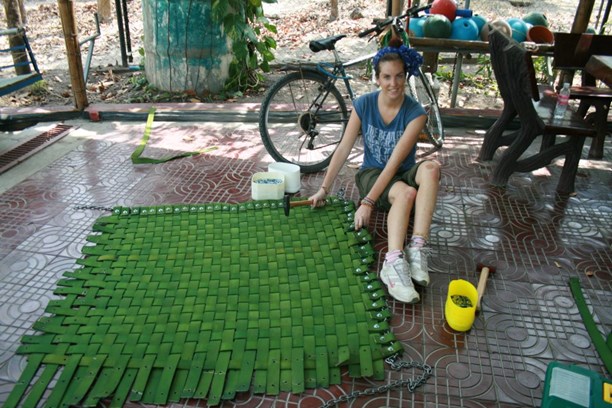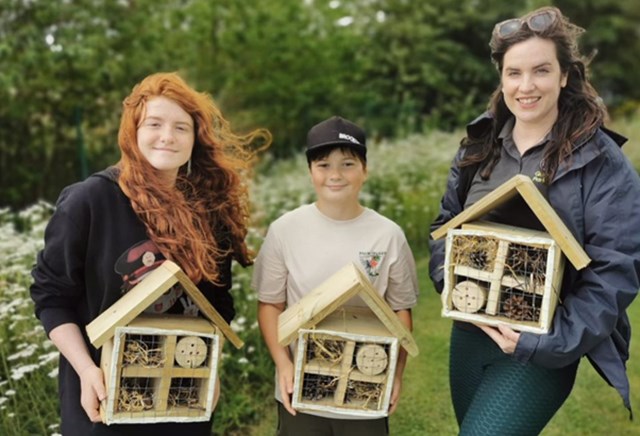Claim learners’ certificates by Friday 11 July. If your qualification doesn’t include an external assessment and learners are expecting results in August, make sure to claim certificates by this date. For qualifications with external assessments, claim within two working days of receiving confirmed results. Find out more on our timely delivery of results page.
How I turned my passion for the environment into a career in sustainability
Laura McGrath is the Director of Sustainability and Community at Shelborn Asset Management and looks after four business parks across England and Scotland. Her responsibilities include managing green travel fleets, rewilding strategies, community gardens and allotments, as well as overseeing renewable energy projects and other sustainable programmes.
Here Laura talks about her passion for the environment, her path to working in sustainability, and the importance of using transferable skills and experiences when thinking about your future aspirations.
How do you plan for a job that you didn’t know existed when you left school?
Well, you can’t. But give a girl a good dose of autonomy and an ever-growing green economy and, frankly, the sky’s the limit.
I have been obsessed with nature, animals, and the wild since I was little. My mum tells a story about me knowing the species of about 20 different whales when I was five.
At age seven, I used to write letters to brands that tested on animals pleading them to stop. At age nine, I staged a one-girl protest in the school playground about freeing dolphins from captivity.
My bedroom was littered with books, posters, and magazine subscriptions. The natural world held me entranced and I knew for certain that I was going to grow up to be a jungle explorer.
From science to South America
You can imagine my surprise as an 18-year-old school leaver considering my options for study at university when I discovered that ‘jungle explorer’ wasn’t a course. Also – if it had been – three A Levels in English Literature, History, and Business Studies weren’t going to cut it!
Where younger me had harboured a passion for all things wild, teenage me was always much better at writing than science. The numbers, strict rules and structure confused me, so I’d dropped them the second I could.
I don’t remember anyone ever asking me what I wanted to do when I made my subject choices – I just remember being glad I never had to look at the periodic table again.
After university I began working in office jobs, not really thinking about what I wanted to do other than save up and travel the world. I worked to fund trips – not to carve a career path. I wish I’d known then that you really can do both!

Laura volunteered her time to various projects during her travels
Everything changed when I finally made it on my lifelong planned adventure. I spent over a year exploring South America and Southeast Asia. I climbed mountains and crossed the full width of the Brazilian stretch of the Amazon River on a boat, sleeping in a hammock each night.
Along the way, I filled my time with various volunteering projects. I worked with children, at an animal sanctuary, and for a nature reserve, and it was through this volunteering that I discovered sustainability.
I’m not talking here about environmentalism – that had been in my bones since childhood – but sustainability; the balance of the natural world with the people who lived in it.
We all know how to save the rainforest, but we know less about how to save it whilst making sure that those living nearby have careers, financial stability, and security. That’s the story of sustainability.
Making it a career
I came home in 2012 and ended up using my volunteering experience as part of a job interview at Balfour Beatty. The role was designed to balance environmental management and social issues around healthy communities and wellbeing.
This then led me to meeting the team at Quorum Park and ultimately going onto become the Events and Sustainability Manager there in 2013. This was a decade ago, so you can imagine that the role was more ‘events’ than ‘sustainability’ – but it was certainly a step in the right direction.
Here’s where autonomy comes in. Since 2013, I’ve slowly changed, grown, and shaped the role to become more focused on sustainability. This has been helped by shifting views towards the environment and climate change – although I’ll always say the pace is not quick enough.
I’ve spent years pushing the story that sustainability is about more than ‘green’ through the linking of wider social issues to the topic. Sustainability was very new as a career path, so I got to shape what I wanted to communicate. I realised very quickly that most people don’t connect with rhetoric around carbon savings and renewable energy, but do have thoughts on wellbeing, cycling and nature.
In 2015 I met Tamma Carell from Imvelo Ltd who introduced me to the United Nation’s Sustainable Development Goals, and I realised I’d been right all along. It’s about people, planet, and profit – creating a balanced space for all three.
I’ve since developed my learning with further training to become a Practitioner for the Institute of Environmental Management, and when Environmental Management Systems went out of fashion in favour of Environmental Social Governance, it was my time to thrive.
When I was younger, I’d never realised that the fun, wild, outdoorsy things I loved when travelling could end up as part of my daily role. Things like outdoor cycling adventures, nature and biodiversity are all part of my working life, but I also get involved in a meaningful and strategic contribution to the fight against climate change.

The building of "bug hotels" is just one of many projects that Laura hosts
Tips and advice
Carbon Literacy training is a fantastic starting point for people wanting to find out the basics without feeling like you’re back in a school science classroom.
There are also some essential skills that you’ll need to work in sustainability, but most are transferable from other sectors and everyday life.
- Critical thinking – rarely is anything a right or wrong answer, it’s considered balanced. Once you learn to critically analyse the impacts you can devise the best approach.
- Adaptability for your audience – some people care, and some don’t. Find their personal hook and don’t assume your own motivations will work for everyone.
- Resilience – it's really tough going at times. The more you learn, the scarier the future can look – but with a positive outlook and belief, we can change the world.
As Net Zero 2050 looms large in the business world, sustainability is a bigger priority than ever before and will only continue to grow.
Successful businesses will realise that, rather than just offsetting emissions, embracing the conversation and exploring wider issues will ignite the passions of their staff, stakeholders and customers.
That means more and more opportunities will be available for people to turn their own passion for the environment into a career, in the same way that I’ve been able to.
I firmly believe the connection between people and nature will eventually be the big story of the climate crisis. Covid-19 got everyone out of their homes, and they fell back in love with the planet. Now, they want to save it.
To learn more about sustainability, green jobs, and how NCFE can support you, visit our sustainability webpage.
When I was younger, I’d never realised that the fun, wild, outdoorsy things I loved when travelling could end up as part of my daily role. Things like outdoor cycling adventures, nature and biodiversity are all part of my working life, but I also get involved in a meaningful and strategic contribution to the fight against climate change.

Engaging new sustainability for early childhood resource published by NCFE
Our brand new resource, Sustainability Matters in Early Childhood, will support and empower the early years sector to learn more about our responsibilities to each other and the world in which we live.

Striving for a green future with NCFE's sustainability qualifications
As a provider offering our Level 1 and 2 qualifications in Environmental Awareness, we speak with Strive Training to learn more about their experience.

Innovative approach to embedding sustainability into early years wins international award
Our Early Childhood Education for Sustainability resource has been selected for the 2022 Education for Sustainable Development Award by the OMEP.


